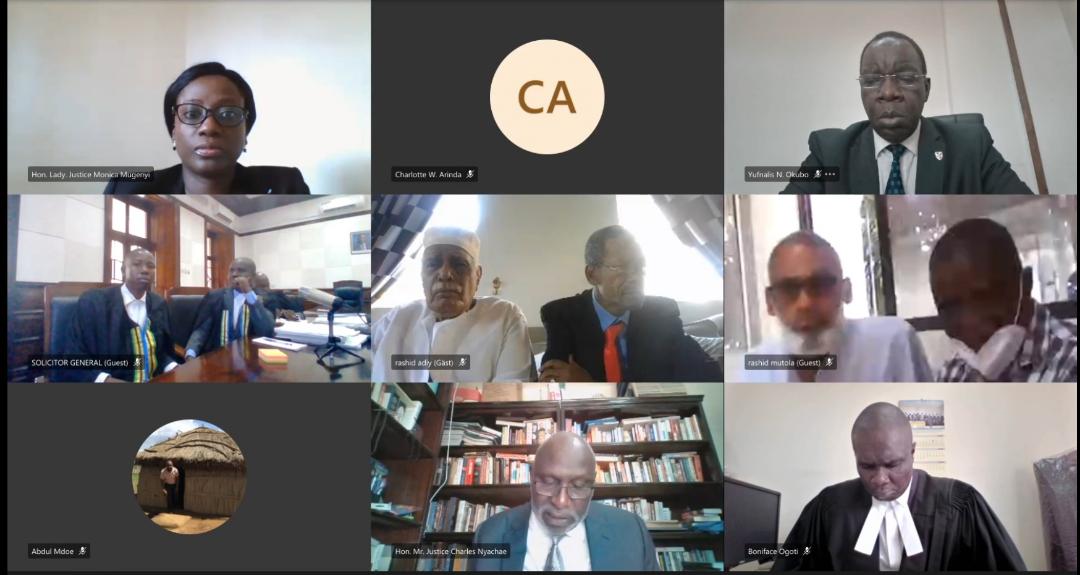
Court dismisses a matter challenging the legality of the union of Tanzania
East African Court of Justice, 1st October , 2020: The First Instance Division upheld preliminary objections raised by the Attorney General of Tanzania (Respondent) and dismissed Reference No.9 of 2016 Rashid Salim Adiy & Others vs The Attorney General of the United Republic of Tanzania & 2 Others.
The matter was filed by the Citizens of Zanzibar claiming inter alia that the purported unification of the Republic of Tanganyika and the Peoples Republic of Zanzibar to form a United Republic of Tanzania is a nullity. The Applicants were seeking Court’s declarations among others, that the purported Article of the Union allegedly signed on the 22nd April, 1964 between the Republic of Tanganyika and the Peoples Republic of Zanzibar is non-existent.
Court struck out the 1st & 2nd Respondents (Tanganyika & Zanzibar respectively) because they are neither Partner States nor EAC Institutions and therefore have no locus standi before it.
At the hearing the Respondent raised two Preliminary Objections on the jurisdiction of the Court to entertain the matter and also the issue of the Reference being time barred and were both upheld by the Court. The Court held that it lacks jurisdiction to entertain a Reference whose subject matter pre-dates the EAC Treaty, given that Treaties do not apply retrospectively.
The Court further upheld the objection on time limitation given that the contested Union between the Republic of Tanganyika and the Peoples Government of Zanzibar occurred in 1964. “In so far as the Court neither has the mandate to extend the time limitation, nor the liberty to treat the alleged Treaty breaches herein as continued violations; the Court clearly has no jurisdiction ratione temporis to entertain this Reference.” Court stated
Article 30(2) of the Treaty provides that; The proceedings provided for in this Article shall be instituted within two months of the enactment, publication, directive, decision or action complained of, or in the absence thereof, of the day in which it came to the knowledge of the complainant, as the case may be.
Court further was in agreement with the Respondents’ argument that, the impugned acts of the Republic of Tanganyika and the Peoples’ Revolutionary Republic of Zanzibar are stated to have been effected in 1964, many years prior to the existence of the Treaty.
The Respondents were emphatic in their submissions that under both general international law, as well as the jurisprudence of this Court, acts that ensued prior to the coming into force of the Treaty are not within the purview of the Court to interrogate. This is the principle of non-retroactive application of a treaty.
The Applicants were represented by Rashid Adiy and Rashid Mutola the Advocate while the Respondents were represented by the Deputy Solicitor General of Tanzania Counsel Gabriel Malata. Judgment was delivered via Video Conference by Honourable Justices of the First Instance Division: Lady Justice Monica Mugenyi (Principal Judge), Audace Ngiye and Dr Charles Nyachae.
ENDS
For more information, please contact:
Yufnalis Okubo
Registrar
East African Court of Justice
Arusha, Tanzania
Tel: +255 27 2162149
mail: Okubo [at] eachq.org
www.eacj.org
About the East African Court of Justice:
The East African Court of Justice (EACJ or ‘the Court’), is one of the organs of the East African Community established under Article 9 of the Treaty for the Establishment of the East African Community. Established in November 2001, the Court’s major responsibility is to ensure the adherence to law in the interpretation and application of and compliance with the EAC Treaty.
Arusha is the temporary seat of the Court until the Summit determines its permanent seat. The Court’s sub-registries are located in the respective National Courts in the Partner States.
Tags: EACJ
